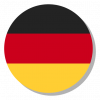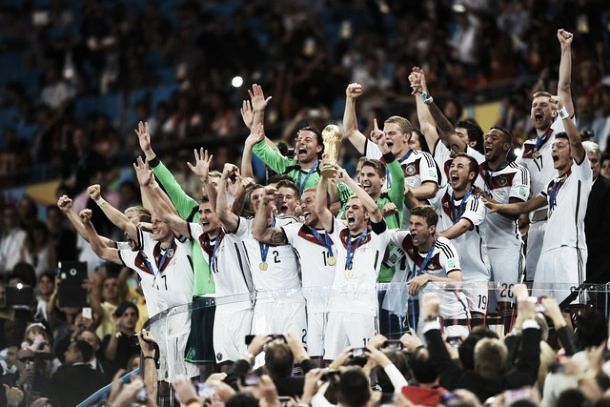As Germany finally lifted the famous trophy after a 24-year wait between World Cup triumphs, a feeling of accomplishment reigned among all involved with Die Nationalmannschaft over the past decade. Not only for the obvious reason of having won the biggest prize available in football, but also for the long, and at times tedious journey to revolutionize German football after the uncertainty of the late-1990's and the doldrums of the early-2000's. Resiliency, efficiency and meticulous preparation and execution remains inherently German qualities, but it has been shifted down the pyramid of description by flair, youthful exuberance and now, finally, tournament success.
The rebuild of German football began in earnest after the ill-fated Euro 2000 campaign in which Germany were, quite frankly, embarrassed by the opposition. Losses to Portugal and England was enough to send Die Nationalmannschaft crashing out of the tournament, with a lackluster draw against Romania only serving to rub salt in the already gaping wounds. Erich Ribbeck, the coach of the German National Team at the time, was prehistoric in his approach to football. His insistence on playing a 39-year-old Lothar Matthäus as a sweeper was as sad as it was naive, with the kapitän still willing in spirit, but not so in physical prowess. Instead of ignoring the problem, the DFB looked for solutions and came to the logical conclusion that a complete rebuild is needed from the ground up, with all German clubs being required to run centrally controlled youth academies. The seeds of change were sown, but it would still take time to grow.
In the meantime, Germany had produced a truly world-class player in Michael Ballack, who surely to this day will be cursing the fact that he was born a decade too soon. At Bayer Leverkusen, the midfielder developed from a brilliant talent into a proven performer at the top level, taking Die Werkself to the cusp of glory in not only the Bundesliga, but the UEFA Champions League as well. After moving to Bayern Munich, he truly blossomed as a player and leader, eventually becoming one of the most admired midfielders of his generation. However, between all this success at club level, there was always disappointment at national level, as Michael Ballack was asked to almost single-handedly, with some help from Oliver Kahn, carry Die Nationalmannschaft. The fact that Germany reached the final of the 2002 FIFA World Cup was largely thanks to these two players and a favorable run-in against the likes of the USA and Korea, with a certain Miroslav Klose making his debut on the grandest stage of all. This performance was only a flash in the pan, though, as the chinks in the German armour was obviously apparent in the ill-fated Euro 2004 campaign. As Michael Ballack himself once quoted; "They want me to win the ball in defense, dominate the midfield and then play a pass to myself in the final-third before scoring".
Nobody wanted the job of Nationaltrainer after this fiasco, with the likes of Ottmar Hitzfeld and Arsene Wenger turning down offers from the DFB. Enter Jürgen Klinsmann and his assistant Joachim Löw, who were about to revolutionize German football. It was far from love at first sight, with the media all too happy to criticize the new national manager when results did not go all their way. However, there were glimmers of what was to come, with the emergence of Philipp Lahm, Bastian Schweinsteiger and Lukas Podolski becoming the catalyst of a new dawn in German football, only gathering even more momentum after the immensely successful 2006 FIFA World Cup. The hosts of that tournament had not only wowed the world with their hospitality, but also a new brand of football which excited and showcased the new blood to graduate to Die Nationalmannschaft. Afterwards, the DFB identified the importance of continuity, appointing Joachim Löw as the heir to Jürgen Klinsmann.
After another impressive tournament at Euro 2008, where Germany fell in the final to a Spain side that would go on to dominate football for the next six years, the boom of talent to emerge from youth systems arrived in full. The likes of Mesut Özil, Sami Khedira, Thomas Müller and Manuel Neuer began making names for themselves in the Bundesliga, while Philipp Lahm and Bastian Schweinsteiger began to reach elite status in world football. There was to be a sad twist in the tale, though, as Michael Ballack was injured before the start of the 2010 FIFA World Cup, never to be seen in the national shirt again. However, Germany was finally equipped to be successful without the man who has been their leader and star for so long, with Die Nationalmannschaft impressing immensely en route to a semi-final exit to Spain. Stars were born in South Africa, and thus expectations increased significantly looking forward to Euro 2012.
By the time this tournament came around in Poland & Ukraine, Die Nationalmannschaft were fully expected to go all the way and triumph. The youngsters of 2010 had become superstars, while the emergence of Toni Kroos added another gem to the already glittering crown of the German team; the midfield. Yet a tactical blunder by Joachim Löw in trying to man-mark the irrepressible Andrea Pirlo against Italy sent the Germans crashing out of the tournament unceremoniously, and the calls for a new manger became increasingly more frequent. To their credit, the DFB kept their patience and faith in the current manager, but pressure was starting to build. The German talent conveyor belt continued churning out stars at an incredible rate as the 2014 FIFA World Cup drew nearer, with Mario Götze, Mats Hummels, Marco Reus and numerous others emerging as future stars.
In Brazil, it was as if everything came together for Die Nationalmannschaft to finally achieve their goal of global superiority, epitomized by the historic six-goal thrashing of the host nation. Argentina posed a stern test in the final, but the tireless efforts of stalwarts Bastian Schweinsteiger and Philipp Lahm, combined with the coming-of-age experienced by Toni Kroos and unorthodox brilliance of Thomas Müller ensured a fourth star for Germany on their revered shirt. Perhaps it is poetic justice that young stars Andre Schürrle and Mario Götze were the ones to link up and score Germany the goal that brought them the World Cup, after 14 years of incredibly hard work at all levels of the game. The dazed and euphoric look on the face of Joachim Löw as he walked around on the pitch after Die Nationalmannschaft had received their trophy told more than any words could have described:
Germany are finally back where they belong.






































